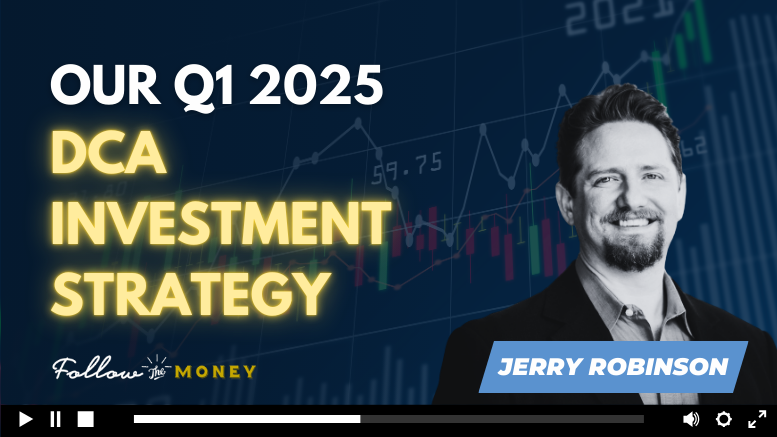(Recorded on 01/14/25) In this members-only webcast, trading coach Jerry Robinson shares our dollar-cost-average investment strategy for Q1 2025, including the specific stocks, ETFs, and cryptos we are buying. – DCA Investment Strategy 101 –...

Podcast: Play in new window | Download (Duration: 4:02 — 2.9MB) | Embed
by John Bearss
Qualified vs Non Qualified Retirement Plans? When it comes to your financial plan, it is important to understand the difference between “Qualified” money and “Non Qualified” money.
There are two types of money in the eyes of the IRS: Qualified Money and Non Qualified Money.
This means you did not pay taxes on this money when you invested it. While invested, this money will grow tax-deferred. No taxes will be owed on gains within the account each year and therefore you will not get a 1099 form each year. Qualified plans receive this special tax treatment because they were designed with retirement in mind.
Of course, if you don’t pay the taxman now, you will simply pay him later. Taxes will become due on a Qualified plan each year that you draw an income from the plan. And if you decide to take the money out before the current minimum distribution age of 59 1/2, you will also pay a stiff 10% penalty to the IRS on the entire withdrawal amount. Finally, once you reach age 70 ½, the IRS requires you to begin taking required minimum distributions from your Qualified account each calendar year.
When you invest outside of a “Qualified” plan, you do not get to write off this investment on your taxes. Put simply, money invested into Non Qualified plans will not get an upfront tax break. Additionally, the investment earnings could be taxable each year. It all depends on the type of investment you use.
For example, if you place your Non Qualified investment dollars into a CD at the bank, you will have to pay tax on the interest earnings every year. Each year, the bank will send you a 1099 tax form showing you the amount of interest earned. You are required to pay taxes on those earnings for that specific tax year. Note that you will have to pay a tax on these earnings regardless of whether you took the money out of the Bank CD or not.
Investors who want to shield their Non Qualified money from an annual tax bill have another option. One popular type of Non Qualified Retirement Plan is an annuity.
An annuity can be classified as “Non Qualified” money, but can grow “tax deferred” just like Qualified money.
In other words, all of your earnings on an Non Qualified annuity will NOT trigger an annual 1099 tax form from the annuity company. This means that you will not have to pay a tax on the earnings each year even though the money is not held within a “Qualified” plan.
And like a Qualified plan, you will only pay taxes when you begin taking withdrawals from the annuity. But your taxes will only be paid on the “gains” that you have earned from the annuity. Deferring your taxes until the time that you actually begin taking distributions (income) is a great way to allow your money to grow faster. It also gives you the control to pay the taxes on the investment only when you want to.
Recently, one of our readers reached to me for retirement advice. She wanted to make some changes to her retirement plan but told me that because she owned an IRA CD at her bank, she was unable to transfer this money because it would become taxable to her when she transferred it. I explained to her that indeed she could. Most people believe that an IRA is an investment product, but it is not. Instead, an IRA is an IRS Tax Code.
Likewise, Qualified money and Non Qualified money is an IRS Tax Code Law. You can invest your retirement money into any investment that you want.
You could use:
In other words, all investment products can be set up to be treated as Qualified money or Non Qualified money.
NOTE: As you approach retirement, it is important for you to understand how each type of money is taxed. This will prevent you from getting stuck with a massive tax bill that you did not anticipate. I love helping people maximize their tax savings from their investments. Read about one my favorite tax-free strategies here.
Until next week!
Disclaimer: Investing involves risk. Always do your own due diligence and consult a trusted financial professional before making any investing or financial decisions.
Please help us spread the word about FollowtheMoney.com on Facebook, Twitter,
and any other social media outlets.
Silver & Gold
Call 800-247-2812 now for the best prices on gold and silver coins and receive Free Shipping and Insurance when you mention Follow the Money.
Weekly Newsletter
Stay in the loop!
Sign up today to receive our
weekly e-newsletter.
FollowtheMoney.com Exclusives